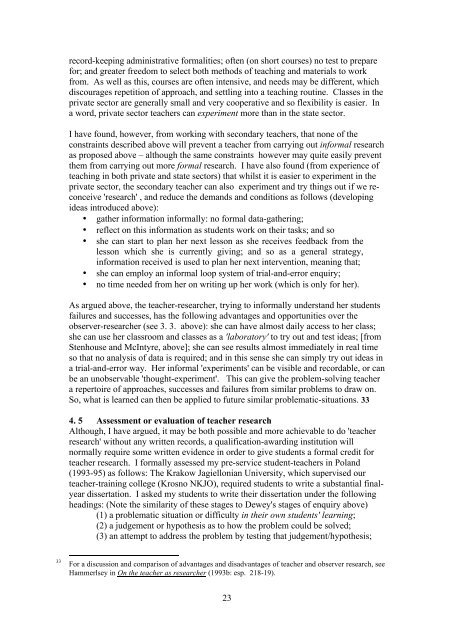RADICAL TEFL
2hqhXJd
2hqhXJd
Create successful ePaper yourself
Turn your PDF publications into a flip-book with our unique Google optimized e-Paper software.
ecord-keeping administrative formalities; often (on short courses) no test to prepare<br />
for; and greater freedom to select both methods of teaching and materials to work<br />
from. As well as this, courses are often intensive, and needs may be different, which<br />
discourages repetition of approach, and settling into a teaching routine. Classes in the<br />
private sector are generally small and very cooperative and so flexibility is easier. In<br />
a word, private sector teachers can experiment more than in the state sector.<br />
I have found, however, from working with secondary teachers, that none of the<br />
constraints described above will prevent a teacher from carrying out informal research<br />
as proposed above – although the same constraints however may quite easily prevent<br />
them from carrying out more formal research. I have also found (from experience of<br />
teaching in both private and state sectors) that whilst it is easier to experiment in the<br />
private sector, the secondary teacher can also experiment and try things out if we reconceive<br />
'research' , and reduce the demands and conditions as follows (developing<br />
ideas introduced above):<br />
• gather information informally: no formal data-gathering;<br />
• reflect on this information as students work on their tasks; and so<br />
• she can start to plan her next lesson as she receives feedback from the<br />
lesson which she is currently giving; and so as a general strategy,<br />
information received is used to plan her next intervention, meaning that;<br />
• she can employ an informal loop system of trial-and-error enquiry;<br />
• no time needed from her on writing up her work (which is only for her).<br />
As argued above, the teacher-researcher, trying to informally understand her students<br />
failures and successes, has the following advantages and opportunities over the<br />
observer-researcher (see 3. 3. above): she can have almost daily access to her class;<br />
she can use her classroom and classes as a 'laboratory' to try out and test ideas; [from<br />
Stenhouse and McIntyre, above]; she can see results almost immediately in real time<br />
so that no analysis of data is required; and in this sense she can simply try out ideas in<br />
a trial-and-error way. Her informal 'experiments' can be visible and recordable, or can<br />
be an unobservable 'thought-experiment'. This can give the problem-solving teacher<br />
a repertoire of approaches, successes and failures from similar problems to draw on.<br />
So, what is learned can then be applied to future similar problematic-situations. 33<br />
4. 5 Assessment or evaluation of teacher research<br />
Although, I have argued, it may be both possible and more achievable to do 'teacher<br />
research' without any written records, a qualification-awarding institution will<br />
normally require some written evidence in order to give students a formal credit for<br />
teacher research. I formally assessed my pre-service student-teachers in Poland<br />
(1993-95) as follows: The Krakow Jagiellonian University, which supervised our<br />
teacher-training college (Krosno NKJO), required students to write a substantial finalyear<br />
dissertation. I asked my students to write their dissertation under the following<br />
headings: (Note the similarity of these stages to Dewey's stages of enquiry above)<br />
(1) a problematic situation or difficulty in their own students' learning;<br />
(2) a judgement or hypothesis as to how the problem could be solved;<br />
(3) an attempt to address the problem by testing that judgement/hypothesis;<br />
33<br />
For a discussion and comparison of advantages and disadvantages of teacher and observer research, see<br />
Hammerlsey in On the teacher as researcher (1993b: esp. 218-19).<br />
23


